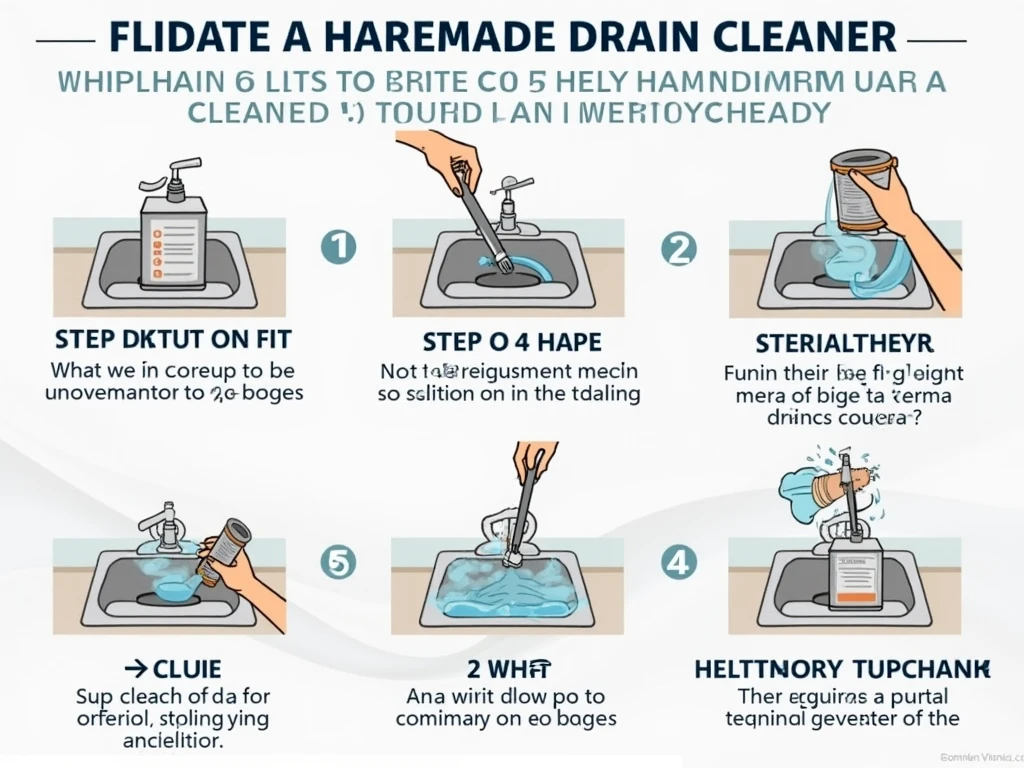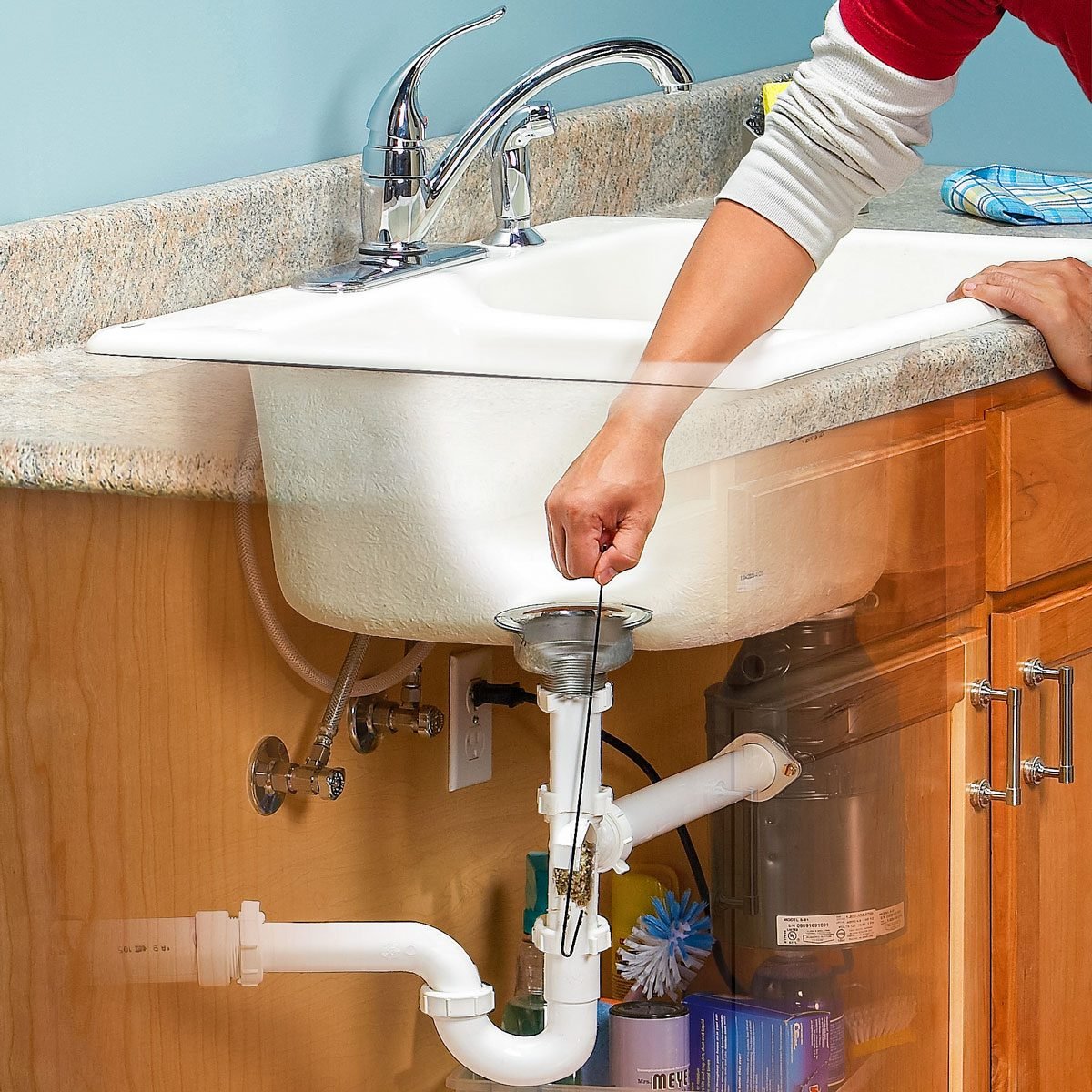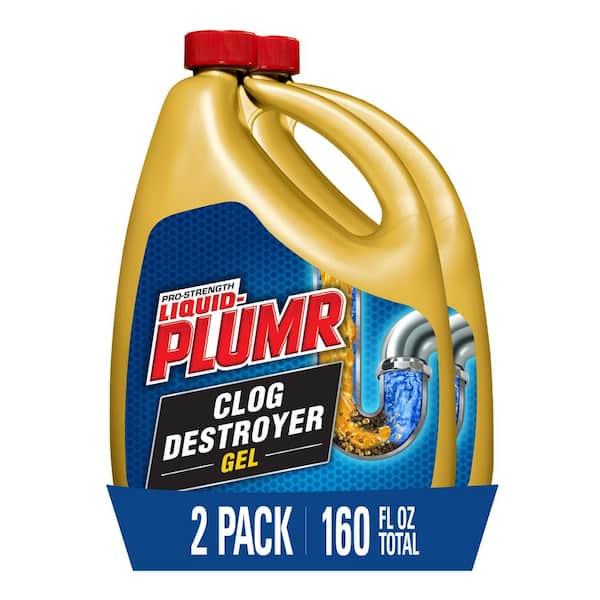Garbage disposal drain cleaner is designed to dissolve food waste and prevent clogging. It ensures your sink remains clear and odor-free.
Kitchen drains often become the final stop for food scraps, with garbage disposals working tirelessly to break down waste. Yet, even the most robust systems encounter buildup that can lead to clogs and unpleasant odors. This is where a specialized garbage disposal drain cleaner becomes indispensable.
Formulated to tackle tough grime, these cleaners help maintain a hygienic and efficient kitchen sink environment. By using the right drain cleaner periodically, homeowners can extend the life of their garbage disposal and avoid the inconvenience of slow drainage or the need for costly repairs. Opting for a reliable and effective cleaner keeps your garbage disposal in top condition, ensuring a clean, fresh kitchen that’s ready for whatever comes its way.

The Science Behind Clogged Drains
When your kitchen sink won’t drain or begins to smell, a deeper look into the sink’s plumbing often points to an invisible culprit: buildup in the pipes. This buildup restricts water flow, leading to those frustrating clogs. Understanding the science behind this common problem is the first step in combatting drain blockages effectively, and keeping those pipes clear. Grab your garbage disposal drain cleaner, and let’s dive into what causes these problematic clogs.
Common Culprits Of Blockages
Clogs don’t just appear; they build up over time. Common household items are often to blame. Let’s unmask these offenders:
- Food scraps: Grease and small food particles from dishwashing slip down drains and stick to pipes.
- Hair and soap: In bathroom drains, hair binds with soap scum forming resilient clogs.
- Foreign objects: Items not meant for drains can get flushed or washed down.
How Materials Accumulate Over Time
It’s the cumulative effect of everyday activities that slowly narrows a drain’s passage. Interactions with water and chemicals create constrictions. Below is a snapshot of how these materials amass:
| Material | Action | Result |
|---|---|---|
| Grease | Sticks to pipe walls | Forms a slick coating attracting other debris |
| Soap Scum | Binds with minerals in water | Creates hard residue |
| Hair/Food Particles | Entangle and compact | Block water flow |
The truth of the matter is, preventive measures and regular maintenance with a quality garbage disposal drain cleaner can keep your pipes flowing smoothly. Recognizing these science-driven insights can save you time and protect your plumbing.
Choosing Your Drain Cleaner Weapon
Choosing Your Drain Cleaner Weapon is vital to maintaining a healthy, clog-free garbage disposal. Various products and tools promise a quick fix, but selecting the right one makes all the difference. The perfect cleaner dislodges gunk effectively without harming your pipes or the environment. Strap in, as we explore the battle of cleaners to keep your disposal in top shape!
Chemical Vs Natural Solutions
When faced with a blocked drain, you might consider a chemical cleaner for its powerful unclogging prowess. These solutions often promise to dissolve even the most stubborn blockages. Yet, they come at a cost. The harsh chemicals may deteriorate your pipes over time and harm aquatic ecosystems when they find their way into natural water sources.
On the flip side, natural solutions offer a kinder approach. Baking soda and vinegar, for instance, create a fizzy reaction that can dislodge buildup without the harshness. Plus, they’re safe for the environment.
- Chemical Cleaners: Fast-acting, powerful, potentially harmful to pipes/environment.
- Natural Solutions: Safer, eco-friendly, gentle yet effective.
Gadgetry At Your Disposal
When chemicals and natural remedies tech-savvy approach, motorized drain augers bring extra power to the battle. Although pricier, these tools snakes reach deeper, retrieving or breaking apart the offending masses.
For a tech-savvier approach, motorized drain augers bring extra power to the battle. These tools, albeit pricier, offer a reusable and effective long-term solution for recurrent blockages.
| Tool | Use Case | Effectiveness |
|---|---|---|
| Plunger | Minor blockages | Moderate |
| Drain Snake | Deep clogs | High |
| Motorized Auger | Stubborn/Recurrent clogs | Very High |
Diy Drain Cleaning Techniques
Welcome to our segment on DIY Drain Cleaning Techniques. Before you call the professionals, know that clogged drains can often find relief from simple, at-home methods. Home remedies not only save you money but also keep your pipes free from harsh chemicals. Below, explore effective, easy-to-follow methods to get your garbage disposal drain running smoothly again without the need for a professional plumber.
Boiling Water Trick
Start by boiling a pot of water. Once it reaches a rolling boil, carefully pour it directly down the drain. This method works best for greasy clogs, as the hot water melts away the grease that may be coating your pipes, allowing debris to flush away. It’s a quick and cost-efficient solution to try first.
Baking Soda And Vinegar Volcano
Just like in science class, create a reaction in your drain with these household staples. Pour half a cup of baking soda followed by half a cup of vinegar down the disposal. Immediately plug the drain to direct the fizzing action down the pipes, which helps to dislodge blockages. After waiting for 5-10 minutes, flush the drain with hot water to clear out the residue.
- Step 1: Pour half a cup of baking soda into the drain.
- Step 2: Add half a cup of vinegar and quickly cover the drain.
- Step 3: Wait and let the mixture sit for 5-10 minutes.
- Step 4: Flush with hot water to remove the clog.
Plunging Into Action
A traditional plunger can often do the trick. Place it over your drain and ensure a good seal. Use strong, quick plunges to create pressure and suction. This motion often dislodges whatever is causing the blockage, making it an effective tool for minor clogs.
- Seal the plunger over the drain.
- Pump vigorously to create suction.
- Check if the water drains smoothly.

Credit: www.familyhandyman.com
When To Bring Out The Big Guns
Sometimes, your garbage disposal drain cleaner needs a tougher approach.
Stubborn clogs don’t stand a chance when we bring out the big guns.
Professionals often turn to heavier equipment for these challenging situations.
It’s time to look at options that pack more punch.
The Power Of Drain Snakes
Drain snakes, also known as plumbers’ snakes, mean serious business.
Their coiled, flexible cables navigate through twists and turns.
When plungers fail, drain snakes take charge.
- Narrow passages? No problem. The snake slithers through.
- Break up and grab debris. They leave drains clean.
- Diverse sizes tackle any clog, any where.
Hydro Jetting: A Forceful Flush
Hydro jetting is a high-pressure cleaning solution.
It blasts away years of buildup.
| PSI | Cleaning Impact |
|---|---|
| 1,500 – 4,000 | Removes grease, scale, and other soft blockages |
| Over 4,000 | Cuts out hard, stubborn obstructions |
This method is safe for pipes and eco-friendly.
No chemicals are needed, just water.
Prevention: The Best Form Of Defense
Prevention: The Best Form of Defense when it comes to keeping garbage disposal drain cleaner functioning well. Taking proactive steps can save you from the hassle of unclogging and repairing.
Daily Habits For Drain Health
Good daily habits are key to preventing drain blockages. Here are easy-to-follow steps:
- Scrape plates into the trash before washing.
- Use cold water when grinding food waste.
- Avoid pouring oil and grease down the drain.
- Run disposal regularly to prevent rust and corrosion.
Regular Maintenance Routines
Regular maintenance keeps your disposal in top condition.
| Frequency | Action |
|---|---|
| Weekly | Flush with hot water and baking soda. |
| Monthly | Grind ice cubes and salt for blade sharpening. |
| Bi-Annually | Inspect for leaks and wear. |

Credit: trusteyman.com
Professional Help Or Diy?
Professional Help or DIY? Deciding between tackling a garbage disposal drain clog yourself or calling in professionals can be a challenging decision. Garbage disposals are a modern kitchen convenience, but when they get clogged, it’s essential to approach the problem correctly. A misstep could mean the difference between a quick fix and a costly repair. Knowing when to roll up your sleeves or dial for expert assistance is key.
Assessing The Severity Of A Clog
Determining the severity of a clog is the first step. Use these methods:
- Visual Inspection: Shine a flashlight down the drain. Look for obvious blockages.
- Test Runs: Run water to see if it drains slowly or not at all.
- Simple Solutions: Try a plunger or baking soda with vinegar to dislodge minor clogs.
When To Call The Experts
Dial a professional when:
| Issue | Action |
|---|---|
| Multiple failed DIY attempts | Pro assistance needed |
| Drain makes unusual noises | Expert evaluation required |
| Standing water persists | Call in the pros |
| Bad odors linger after cleaning | Seek professional help |
Frequently Asked Questions Of Garbage Disposal Drain Cleaner
Is It Ok To Put Drain Cleaner In A Garbage Disposal?
Avoid using drain cleaners in a garbage disposal, as they can damage the unit. Instead, try natural alternatives like vinegar and baking soda or call a professional.
How Do You Clean A Garbage Disposal Drain?
Turn off the garbage disposal power. Run hot water to loosen grime. Sprinkle baking soda and vinegar down the drain and let it fizz. Rinse with hot water. Grind ice cubes and salt to sharpen blades and remove buildup. Flush with cold water afterward.
How Do You Unclog A Garbage Disposal Drain?
Turn off the garbage disposal. Use pliers to remove visible clogs. Pour a mixture of vinegar and baking soda down the drain. Wait 15 minutes, then run hot water. Retry the disposal. If unsuccessful, use a plunger or plumber’s snake.
Contact a professional if needed.
Can You Pour Liquid-plumr In A Garbage Disposal?
Yes, you can use Liquid-Plumr in a garbage disposal, but follow the label instructions closely for safe and effective use.
Conclusion
Maintaining a clean garbage disposal is crucial for kitchen hygiene and plumbing health. Regular use of a drain cleaner can prevent unpleasant odors and costly repairs. Choose a suitable product or DIY solution, and ensure your disposal system stays pristine and fully functional.
Remember, a little routine maintenance goes a long way!

